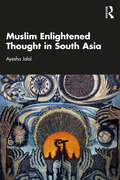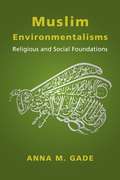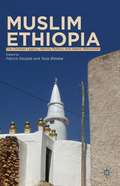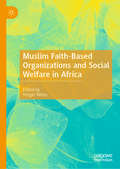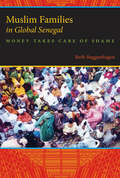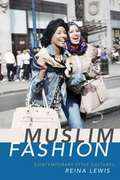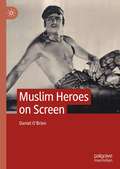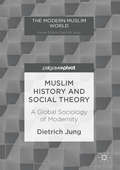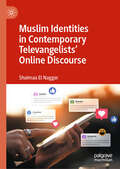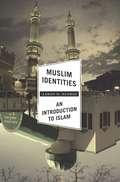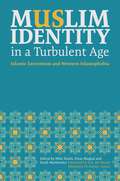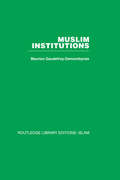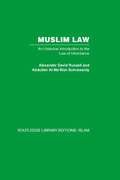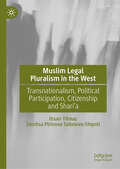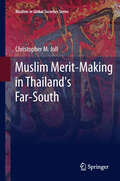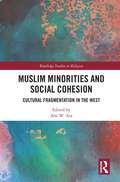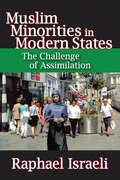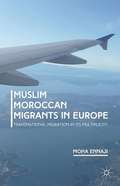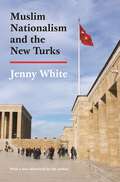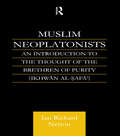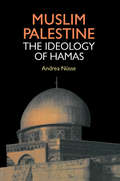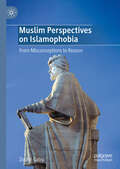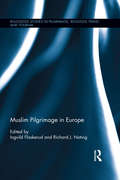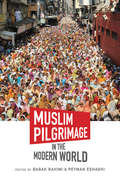- Table View
- List View
Muslim Enlightened Thought in South Asia
by Ayesha JalalMuslim Enlightened Thought in South Asia is an engaging history of the enlightened liberality of modern Muslim poets, philosophers, educationists, novelists, historians, artists and public intellectuals who drew on a long Muslim intellectual tradition beyond the “Western” liberalism of empire.Interpreting the pathbreaking contributions of an array of creative Muslim figures, the book challenges the view portraying them as exemplars of an insular and defensive “apologetic modernity”. It highlights a strand of Muslim thought and liberality of mind that has been ignored by scholars obsessed with dire and dour theologians. This book questions both the presumptions of historians of liberalism that exclude Muslims from the domain of modern liberal thought and the predilections of those scholars of Islam who lean solely on discovering theological rigidity among ulama. It analyzes the forces that have contributed to the narrowing of intellectual space since the late twentieth century and the resilience of expansive and enlightened ideas that have kept candles flickering in the enveloping darkness.Foregrounding the enlightened conceptions of Ghalib, Sayyid Ahmad Khan, Iqbal and Sadequain on faith, selfhood, history and time – and bringing other Muslim thinkers out of the shadows, the book offers a nuanced reformulation of the meaning of religion for our challenging times. It will be of interest to a wide readership interested in the history of Islam and South Asia.
Muslim Environmentalisms: Religious and Social Foundations
by Anna M. GadeHow might understandings of environmentalism and the environmental humanities shift by incorporating Islamic perspectives? In this book, Anna M. Gade explores the religious and cultural foundations of Islamic environmentalisms. She blends textual and ethnographic study to offer a comprehensive and interdisciplinary account of the legal, ethical, social, and empirical principles underlying Muslim commitments to the earth.Muslim Environmentalisms shows how diverse Muslim communities and schools of thought have addressed ecological questions for the sake of this world and the world to come. Gade draws on a rich spectrum of materials―scripture, jurisprudence, science, art, and social and political engagement―as well as fieldwork in Indonesia and Southeast Asia. The book brings together case studies in disaster management, educational programs, international development, conservation projects, religious ritual and performance, and Islamic law to rethink key theories. Gade shows that the Islamic tradition leads us to see the environment as an ethical idea, moving beyond the established frameworks of both nature and crisis. Muslim Environmentalisms models novel approaches to the study of religion and environment from a humanistic perspective, reinterpreting issues at the intersection of numerous academic disciplines to propose a postcolonial and global understanding of environment in terms of consequential relations.
Muslim Ethiopia
by Patrick Desplat Terje �steb�With a particular focus on the role of situated actors, this book sheds light on the emergence and expansion of Salafism in Bale, Ethiopia from the late 1960s, through the Marxist period (1974-1991) before discussing the rapid expansion and fragmentation of the movement in the 1990s until 2006.
Muslim Faith-Based Organizations and Social Welfare in Africa
by Holger WeissThis book addresses the discourses, agendas and actions of Muslim faith-based organizations and activists to empower Muslim communities in contemporary sub-Saharan Africa. The individual chapters discuss how traditional Muslim welfare and charity institutions, zakat (obligatory or mandatory almsgiving), sadaqa (voluntary almsgiving and donations) and waqf (pious endowments), are used to improve social welfare, focusing on instrumentalization and institutionalization in the collection and distribution of zakat. The book includes case studies from West Africa (Ghana, Burkina Faso, Cote d’Ivoire, Ghana and Senegal), the Horn of Africa (Somalia) and East Africa (Kenya and Tanzania), highlighting the role and interplay of local, national and international Sunni, Shia and Ahmadiyya Muslim faith-based organizations and NGOs. Chapters "Muslim NGOs, Zakat and the Provision of Social Welfare in Sub-Saharan Africa: An Introduction" and "Discourses on Zakat and Its Implementation in Contemporary Ghana" are available open access under a Creative Commons Attribution 4.0 International License via link.springer.com.
Muslim Families in Global Senegal: Money Takes Care of Shame
by Beth Buggenhagen“A first-rate ethnography of Muslim women in Dakar . . . [an] extremely fine-grained analysis of women’s exchange networks.” —Robert Launay, Northwestern UniversitySenegalese Murid migrants have circulated cargo and currency through official and unofficial networks in Africa and the world. Muslim Families in Global Senegal focuses on trade and the transmission of enduring social value though cloth, videos of life-cycle rituals, and religious offerings. Highlighting women’s participation in these networks and the financial strategies they rely on, Beth Buggenhagen reveals the deep connections between economic profits and ritual and social authority. Buggenhagen discovers that these strategies are not responses to a dispersed community in crisis, but rather produce new roles, wealth, and worth for Senegalese women in all parts of the globe.“A lively, insightful, and important study of exchange practices between Senegal and a circuit of global trade. The innovative focus is on the meanings, not the social and economic functions, of exchange.” —Karen Tranberg Hansen, Northwestern University“While the author’s focus is on the transformation in the role of women both within the family network and in the marketplace, the book allows readers to better understand the impact of globalism on the citizens of Senegal . . . Recommended.” —Choice
Muslim Fashion: Contemporary Style Cultures
by Reina LewisIn the shops of London's Oxford Street, girls wear patterned scarves over their hair as they cluster around makeup counters. Alongside them, hip twenty-somethings style their head-wraps in high black topknots to match their black boot-cut trousers. Participating in the world of popular mainstream fashion--often thought to be the domain of the West--these young Muslim women are part of an emergent cross-faith transnational youth subculture of modest fashion. In treating hijab and other forms of modest clothing as fashion, Reina Lewis counters the overuse of images of veiled women as "evidence" in the prevalent suggestion that Muslims and Islam are incompatible with Western modernity. Muslim Fashion contextualizes modest wardrobe styling within Islamic and global consumer cultures, interviewing key players including designers, bloggers, shoppers, store clerks, and shop owners. Focusing on Britain, North America, and Turkey, Lewis provides insights into the ways young Muslim women use multiple fashion systems to negotiate religion, identity, and ethnicity.
Muslim Heroes on Screen
by Daniel O'BrienIf films drawing on Middle East tropes often highlight white Westerners, figures such as Sinbad and the Thief of Bagdad embody a counter-tradition of protagonists, derived from Islamic folklore and history, who are portrayed as ‘Other’ to Western audiences. In Muslim Heroes on Screen, Daniel O’Brien explores the depiction of these characters in Euro-American cinema from the silent era to the present day. Far from being mere racial masquerade, these screen portrayals are more complex and nuanced than is generally allowed, not least in terms of the shifting concepts and assumptions that inform their Muslim identity. Using films ranging from Douglas Fairbanks’ The Thief of Bagdad, The 7th Voyage of Sinbad, El Cid, Kingdom of Heaven and The Message to The Wind and the Lion, O’Brien considers how the representational strategies of Western filmmakers may transcend such Muslim stereotypes as fanatic antagonists or passive victims. These figures possess a cultural significance which cannot be fully appreciated by Euro-American audiences without reference to their distinction as Muslim heroes and the implications and resonances of an Islamicized protagonist.
Muslim History and Social Theory
by Dietrich JungThis book combines contemporary discussions on modernity with the history of the Muslim world. From a heuristic perspective, it is sketching out a framework for a global sociology of modernity. This framework attempts to accommodate a core assumption of classical modernization theory - the global nature of modernity - with the pluralistic perspective of the rise of a multiplicity of historically concrete forms of modernities. It tries to reconcile a universalistic concept of modernity with the fact of modernity's multiple historical realizations. At the same time, this discussion of contemporary social theory puts forward a critique of the still so conveniently applied equation of modernization with Westernization. In empirical terms, the book substantiates this critique in drawing its exemplary illustrations from the historical experience of Muslim peoples. Bringing Muslim history and discussions in social theory together, this book represents a synthesis of research efforts in sociology and Islamic studies.
Muslim Identities in Contemporary Televangelists' Online Discourse
by Shaimaa El NaggarThis book examines the discourse of Muslim televangelism in the West, particularly looking at the emergence of 'home-grown' televangelists who grew up in the West and deliver their sermons in English, addressing audiences in contexts such as the UK and the USA. In their sermons, televangelists address topics that are relevant to the everyday life of Muslims and Muslim youth such as friendship, marriage and the misrepresentation of Islam/Muslims in mass media. This book explores contemporary Muslim televangelism and its manifestations in other forms of digital religion, including YouTube, websites and social media which mediate religious content. Using a Critical Discourse Studies approach, the author explores the power structures underpinning the popularity of Muslim televangelism, investigates the linguistic strategies used by Muslim televangelists to construct their identities online, and analyses how Islam and Muslims are represented in their sermons. This book will be of interest to religious studies, media studies, and discourse studies scholars, and to anyone interested in the topic of Islam/Muslims in the West in the contemporary age.
Muslim Identities: An Introduction to Islam
by Aaron HughesRather than focus solely on theological concerns, this well-rounded introduction takes an expansive view of Islamic ideology, culture, and tradition, sourcing a range of historical, sociological, and literary perspectives. Neither overly critical nor apologetic, this book reflects the rich diversity of Muslim identities across the centuries and counters the unflattering, superficial portrayals of Islam that are shaping public discourse today.Aaron W. Hughes uniquely traces the development of Islam in relation to historical, intellectual, and cultural influences, enriching his narrative with the findings, debates, and methodologies of related disciplines, such as archaeology, history, and Near Eastern studies. Hughes's work challenges the dominance of traditional terms and concepts in religious studies, recasting religion as a set of social and cultural facts imagined, manipulated, and contested by various actors and groups over time. Making extensive use of contemporary identity theory, Hughes rethinks the teaching of Islam and religions in general and helps facilitate a more critical approach to Muslim sources. For readers seeking a non-theological, unbiased, and richly human portrait of Islam, as well as a strong grasp of Islamic study's major issues and debates, this textbook is a productive, progressive alternative to more classic surveys.
Muslim Identity in a Turbulent Age: Islamic Extremism and Western Islamophobia
by Rebecca Catto Christine Seeberg Faith Matters Fiyaz Mughal H.E. Mr Al-Nasser Imran Awan Jamal Al-Shalabi Kristin Shamas Mike Hardy Moh’d Khair Eiedat Sarah Markiewicz Steve RoseHow can Islam be understood in the context of internal struggles for unity and identity, a rise in anti-Muslim hate crime and continued media portrayals of violence, extremism, warfare and oppression? Looking at Islam as a faith, a whole system with political dimensions and through the lens of Western media, this book sets out to clarify the nature of true Islam and the true nature of Islam. With diverse contributions from Muslims, Christians and individuals with no religious affiliations, this collection of essays respond to the King of Jordan's Amman Message - an initiative seeking to clarify Islam as a religion of peace - in light of recent international events such as the Charlie Hebdo controversy. Presenting fresh perspectives on a frequently misrepresented religion, this book offers a platform for debate about Islam's place within Western culture and political systems, and the role that faith communities can play in seeking peace and reconciliation.
Muslim Institutions
by Maurice Gaudefroy-DemombynesOriginally published in 1967, this Companion is designed to help readers of the Qur’an by giving them necessary background information. An account is given of ideas peculiar to the Qur’an, and the main variant interpretations are noted. A full index of Qur’anic proper names and an index of words commented on has been provided. Based on A J Arberry’s translation, this Companion can be used with other translations, or indeed with the original text, since the verses are numbered.
Muslim Law: An Historical Introduction to the Law of Inheritance
by Alexander David RussellThis volume, orginally published in 1925, outlines the historical development of the Muslim law of inheritance in pre-Islamic Law. It discusses the ranking of heirs and guardians, reforms introduced by Muhammad, subsequent development of the law, and rise of the orthodox schools.
Muslim Legal Pluralism in the West: Transnationalism, Political Participation, Citizenship and Shari’a
by Ihsan Yilmaz Denitsa Pirinova Sokolova-ShipoliThis book is a comprehensive introductory text to the subject of Western Muslims’ diverse interpretations, discussions and practices of Shari’a with a particular focus on their daily lives in the West. Through a series of interconnected chapters, the book navigates key themes such as Shari’a and legal pluralism, Shari’a vis-à-vis the experiences and political participation of Muslims in Western democracies, the role of religious scholars, the dynamics of Shari’a courts, Shari’a and multiple belongings, and transnational loyalties. Functioning as a comprehensive reader and handbook, the book offers non-experts a comprehensive understanding of the meaning and relevance of Shari’a in Western contexts, exploring how Muslims interpret and apply its principles in their lived experiences and challenging the one-dimensional narratives.
Muslim Merit-making in Thailand's Far-South
by Christopher M. JollThis volume provides an ethnographic description of Muslim merit-making rhetoric, rituals and rationales in Thailand's Malay far-south. This study is situated in Cabetigo, one of Pattani's oldest and most important Malay communities that has been subjected to a range of Thai and Islamic influences over the last hundred years. The volume describes religious rhetoric related to merit-making being conducted in both Thai and Malay, that the spiritual currency of merit is generated through the performance of locally occurring Malay adat, and globally normative amal 'ibadat. Concerning the rationale for merit-making, merit-makers are motivated by both a desire to ensure their own comfort in the grave and personal vindication at judgment, as well as to transfer merit for those already in the grave, who are known to the merit-maker. While the rhetoric elements of Muslim merit-making reveal Thai influence, its ritual elements confirm the local impact of reformist activism.
Muslim Midwives
by Avner GiladiThis book reconstructs the role of midwives in medieval to early modern Islamic history through a careful reading of a wide range of classical and medieval Arabic sources. The author casts the midwife's social status in premodern Islam as a privileged position from which she could mediate between male authority in patriarchal society and female reproductive power within the family. This study also takes a broader historical view of midwifery in the Middle East by examining the tensions between learned medicine (male) and popular, medico-religious practices (female) from early Islam into the Ottoman period and addressing the confrontation between traditional midwifery and Western obstetrics in the first half of the nineteenth century.
Muslim Minorities and Social Cohesion: Cultural Fragmentation in the West (Routledge Studies in Religion)
by Abe W. AtaThis book examines various attempts in the ‘West’ to manage cultural, linguistic, and religious diversity – focusing on Muslim minorities in predominantly non-Muslim societies. An international panel of contributors chart evolving national identities and social values, assessing the way that both contemporary ‘Western’ societies and contemporary Muslim minorities view themselves and respond to the challenges of diversity. Drawing on themes and priority subjects from Islamic Culture within Euro-Asian, Australian, and American international research, they address multiple critical issues and discuss their implications for existing and future policy and practice in this area. These include subjects such as gender, the media, citizenship, and multiculturalism. The insight provided by this wide-ranging book will be of great use to scholars of Religious Studies, Interreligious Dialogue and Islamic Studies, as well as Politics, Culture, and Migration.
Muslim Minorities in Modern States: The Challenge of Assimilation
by Raphael IsraeliPolitical leaders of the 1930s may be accused of blindness to danger in their failed attempts to appease totalitarian aggression, but no one doubts they believed they were doing so to preserve their way of life. In contrast, Raphael Israeli suggests that twenty-first century appeasement of Islamists, wherever it occurs, is different. Appeasement in the advanced modern states of this century - in Europe, Australia, Canada, and even in parts of Asia - is characterized by what amounts to a self-inflicted humiliation, in misguided efforts to slow the advance of a rising Islamist tide. Such appeasement surrenders core aspects of sovereignty, turning non-Muslim populations into second- and third-class citizens in their own countries.Disturbing warning signs first emerged in Europe, but were either not noticed or denied. They extended to the periphery of the Muslim world, but their development in Western countries were unnoticed or denied, until they hit also the peripheral areas of the Muslim world. Canada and Australia, and to some extent the countries of Asia, fell into a syndrome of denial, which persisted until they were forced to listen, often at a price in human lives and carnage. In Europe, the core of the Muslim presence developed in countries like Britain, France and Germany, which lacked law-enforcement against terrorists because the executive and judiciary emphasized human rights and apparent safety over defensive measures to protect their citizens and way of life.Both the United States and Great Britain needed a traumatic jolt before they moved to act. In the United States, it would be the watershed event of September 11, 2001; in London, the July 7, 2005 bombings. And there were events in other countries: in Spain, the March 2004 Madrid train bombings; in France, the violent riots of 2005; in Amsterdam, the van Gogh murder; in Asia, the Bali horror; and finally in Scandinavia, the Cartoon Affair. These jolts shattered the tranquility of populations who had believed in peaceful coexistence with Muslim immigrants and in the feasibility of their integration into national societies. This study fills a large void in the examination of the consequences of new migrations of Muslim populations into advanced and modern societies throughout the world.
Muslim Moroccan Migrants in Europe
by Moha EnnajiBased on the author's fieldwork and readings of media, government reports, and historical and contemporary records, this book explores how Muslim migrants in Europe contribute to a changing European landscape, focusing on Muslim Moroccan migrants.
Muslim Nationalism and the New Turks: Updated Edition (Princeton Studies in Muslim Politics #52)
by Jenny WhiteTurkey has leapt to international prominence as an economic and political powerhouse under its elected Muslim government, and is looked on by many as a model for other Muslim countries in the wake of the Arab Spring. In this book, Jenny White reveals how Turkish national identity and the meanings of Islam and secularism have undergone radical changes in today's Turkey, and asks whether the Turkish model should be viewed as a success story or a cautionary tale. This provocative book traces how Muslim nationalists blur the line between the secular and the Islamic, supporting globalization and political liberalism, yet remaining mired in authoritarianism, intolerance, and cultural norms hostile to minorities and women.In a new afterword, White analyzes the latest political developments, particularly the mass protests surrounding Gezi Park, their impact on Turkish political culture, and what they mean for the future.
Muslim Neoplatonists: An Introduction to the Thought of the Brethren of Purity
by Ian Richard NettonThe tenth or eleventh century group of the Brethren of Purity (Ikhwan al Safa) are as well known in the Arab world as Darwin, Marx and Freud in the west. Designed as an introduction to their ideas, this book concentrates on the Brethren's writings, analyzing the impact on them of thinkers such as Pythagoras, Plato, Aristotle and the Neoplatonists. Ian Netton traces the influences of Judaism and Christianity, and controversially this book argues that the Brethren of Purity did not belong to the Ismaili branch of Islam as is generally believed.
Muslim Palestine: The Ideology of Hamas
by Andrea NusseThe ideology of Islamic fundamentalists is of central importance in the modern world, but it is often distorted or misunderstood by the international media. This insightful study provides a detailed analysis of the Palestinian Hamas movement's world-view, and shows how the theoretical framework developed by thinkers such as Hassan al-Banna, Sayyis Qutb and al-Mawdudi is applied to a specific political, social and economic context. Nusse explains the fundamentalist position on recent events, such as the Gulf War, the Madrid peace negotiations and the Hebron massacre, and helps to dissipate myths surrounding modern fundamentalist movements and their overwhelming success as opposition movements in the modern world.
Muslim Perspectives on Islamophobia: From Misconceptions to Reason
by Zouhir GabsiThe Islamic positioning of Islamophobia is presented in this book. Through ‘Islamic’ or ‘Muslim’ perspectives, the book engages with various Islamic texts and discourses (spoken and written) emanating from preachers and scholars of Islam to discuss the points of convergence and divergence with the Western interpretation of the phenomenon. The book aims to look at Islamophobia from a hitherto unexplored angle by first analyzing the points of convergence and divergence between the internal (Muslim) and external (Western) perspectives, and then by providing new approaches to curbing Islamophobia through a holistic spiritual dimension of Islam and cultural memory. The book contends that the bridges of understanding between the ‘East’ and the ‘West’ can only be built if some of Islam’s theological concepts, such as the place of reason in Islam, are reinterpreted by considering the Islamic perspectives. While the book acknowledges previous work on Islamophobia, it contributes to a deeper understanding of Islamophobia in its internal and external manifestations by considering the theoretical frameworks of racism and xenophobia. Readers interested in Islamic studies and anti-racism narratives would find this book’s eclectic approach and balanced perspective of the phenomenon informative and enlightening.
Muslim Pilgrimage in Europe (Routledge Studies in Pilgrimage, Religious Travel and Tourism)
by Ingvild Flaskerud Richard J. NatvigIn spite of Islam’s long history in Europe and the growing number of Muslims resident in Europe, little research exists on Muslim pilgrimage in Europe. This collection of eleven chapters is the first systematic attempt to fill this lacuna in an emerging research field. Placing the pilgrims’ practices and experiences centre stage, scholars from history, anthropology, religious studies, sociology, and art history examine historical and contemporary hajj and non-hajj pilgrimage to sites outside and within Europe. Sources include online travelogues, ethnographic data, biographic information, and material and performative culture. The interlocutors are European-born Muslims, converts to Islam, and Muslim migrants to Europe, in addition to people who identify themselves with other faiths. Most interlocutors reside in Albania, Bosnia-Hercegovina, Italy, France, the Netherlands, Great Britain, and Norway. This book identifies four courses of developments: Muslims resident in Europe continue to travel to Mecca and Medina, and to visit shrine sites located elsewhere in the Middle East and North Africa. Secondly, there is a revival of pilgrimage to old pilgrimage sites in South-eastern Europe. Thirdly, new Muslim pilgrimage sites and practices are being established in Western Europe. Fourthly, Muslims visit long-established Christian pilgrimage sites in Europe. These practices point to processes of continuity, revitalization, and innovation in the practice of Muslim pilgrimage in Europe. Linked to changing sectarian, political, and economic circumstances, pilgrimage sites are dynamic places of intra-religious as well as inter-religious conflict and collaboration, while pilgrimage experiences in multiple ways also transform the individual and affect the home-community.
Muslim Pilgrimage in the Modern World (Islamic Civilization and Muslim Networks)
by Babak Rahimi and Peyman EshaghiPilgrimage is one of the most significant ritual duties for Muslims, entailing the visitation and veneration of sites associated with the Prophet Muhammad or saintly figures. As demonstrated in this multidisciplinary volume, the lived religion of pilgrimage, defined by embodied devotional practices, is changing in an age characterized by commerce, technology, and new sociocultural and political frameworks. Traveling to and far beyond the Hajj, the most well-known Muslim pilgrimage, the volume's contributors reveal and analyze emerging contemporary Islamic pilgrimage practices around the world, in minority- and majority-Muslim countries as well as in urban and rural settings. What was once a tiny religious attraction in a remote village, for example, may begin to draw increasing numbers of pilgrims to shrines and tombs as the result of new means of travel, thus triggering significant changes in the traditional rituals, and livelihoods, of the local people. Organized around three key themes—history and politics; embodiment, memory, and material religion; and communications—the book reveals how rituals, practices, and institutions are experienced in the context of an inexorable global capitalism. The volume contributors are Sophia Rose Arjana, Rose Aslan, Robert R. Bianchi, Omar Kasmani, Azim Malikov, Lewis Mayo, Julian Millie, Reza Masoudi Nejad, Paulo G. Pinto, Babak Rahimi, Emilio Spadola, Edith Szanto, and Brannon Wheeler.
